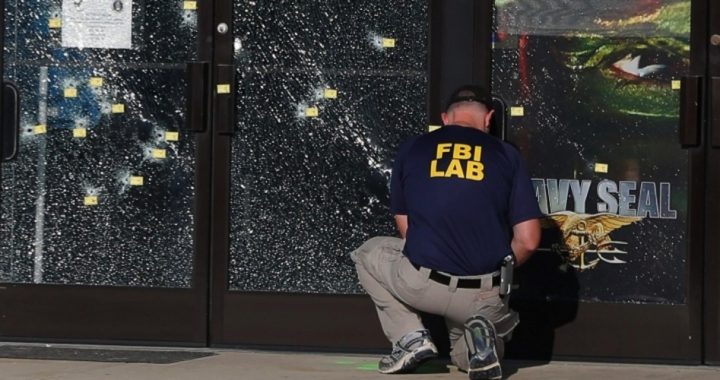
Narratives that Muhammad Youssef Abdulazeez was a nice, polite, well-behaved, friendly, and funny young man of 24 appeared all across the mainstream media following his murderous attack on a military recruiting center in Chattanooga on Thursday that left four dead and three wounded. According to the media and the president, he was “acting alone” as a “lone wolf.”
Precious little was being said about the possibility of him being influenced by radical elements of his faith calling for Muslims to wage war against unbelievers. The media focused instead on his background: a Jordanian born in Kuwait in 1990, moving to the United States a few years later and becoming a naturalized citizen. He attended Red Bank High School in Chattanooga, where he enjoyed wrestling and making videos. He went on to graduate from the University of Tennessee with a degree in electrical engineering, and interned briefly at the Tennessee Valley Authority.
The New York Times said he “seemed to be an all-American boy, handsome and polite,” usually dressed in a T-shirt and jeans.
He did a little blogging, said the media, leaving cryptic messages that the world “is a prisoner for the believer [Muslim] and a paradise for the unbeliever [non-Muslim],” while adding the warning: “Don’t let the society we live in deviate you from the task at hand,” and “This life is short and bitter and the opportunity to submit to Allah may pass you by.”
The media said they could find, at this writing, no links to ISIS, confirming their conclusion that this was a “one-off” event. No links, that is, if one ignores orders issued by ISIS spokesman Abu Muhammad al-Adnani last October calling for individual acts of violence such as this one against soldiers and civilians in “countries that entered into a coalition” against ISIS, and encouraging them to “kill them wherever you find them.”
No links if one ignores the “lone wolf” strategy adopted even earlier by al-Qaeda in the late 2000s and repeatedly encouraged by Anwar al-Awlaki, the Islamic imam and senior terrorist recruiter for al-Qaeda before his death in September 2011. Proclaimed al-Awlaki: “It is better to support the prophet [Muhammad] by attacking those who slander him that it is to travel to the land of Jihad like Iraq or Afghanistan.”
No links if one forgets that ISIS has been calling for “lone wolf” attacks on U.S. military bases during the month of Ramadan, which ends today.
No links if one forgets the long train of other “lone wolf” terrorist attacks by Abdulhakim Mujahid Muhammad in Arkansas in June, 2009, or that of Major Nidal Hasan who killed 13 soldiers at Fort Hood in November, 2009, or that of Arid Uka who shot two U.S. airmen in at the Frankfurt airport in March, 2011, or that of Mohammed Merah who killed seven in Toulouse, France, in March 2012, or that of the brothers Tsarnaev killing three and injuring 260 in the Boston Marathon bombing in April 2013, or the killing of a British soldier in London in May 2013 by Michael Adebolajo and Michael Adebowale who had converted to Islam, or that of Mehdi Nemmouche who attacked and killed four at the Jewish Museum in Brussels in May, 2014.
All this must be forgotten or deliberately ignored in order to conclude that Abdulazeez was acting apart from any outside influence.
And such attacks will likely continue until such time as their targets are allowed to arm themselves. Making military recruiting centers gun-free zones is certainly part of the problem. The federal government should repeal the Clinton-era military recruiting center gun ban that currently prohibits those targets from being able to defend themselves and consequently turning them into sitting ducks for attackers such as Abdulazeez.
Another preemptive measure that the U.S. government would be wise to take in this regard would be to stop its interference in Muslim-dominated countries across the Middle East and North Africa. Much of the recent “jihadist” ideology calling for attacks on the United States and U.S. interests can be attributed to “blowback” from an interventionist U.S. foreign policy toward the Middle East dating back to at least the early 1950s. Also, any shooting or “terrorist” attacks can be used as excuses for the further federalization and growth of the police state along with more military intervention in the Middle East.
While Americans should not be ignorant of the “jihadist” mentality, they must also be aware of the fact that any government can use such radicalization to its advantage in order to consolidate more power. And such consolidation of power in the hands of the federal government is arguably a much greater threat to the freedom of American citizens than any “jihadist,” lone-wolf or otherwise.
Photo of FBI investigator gathering evidence at the scene of the July 16 shooting in Chattanooga: AP Images
A graduate of an Ivy League school and a former investment advisor, Bob is a regular contributor to The New American magazine and blogs frequently at www.LightFromTheRight.com, primarily on economics and politics.



